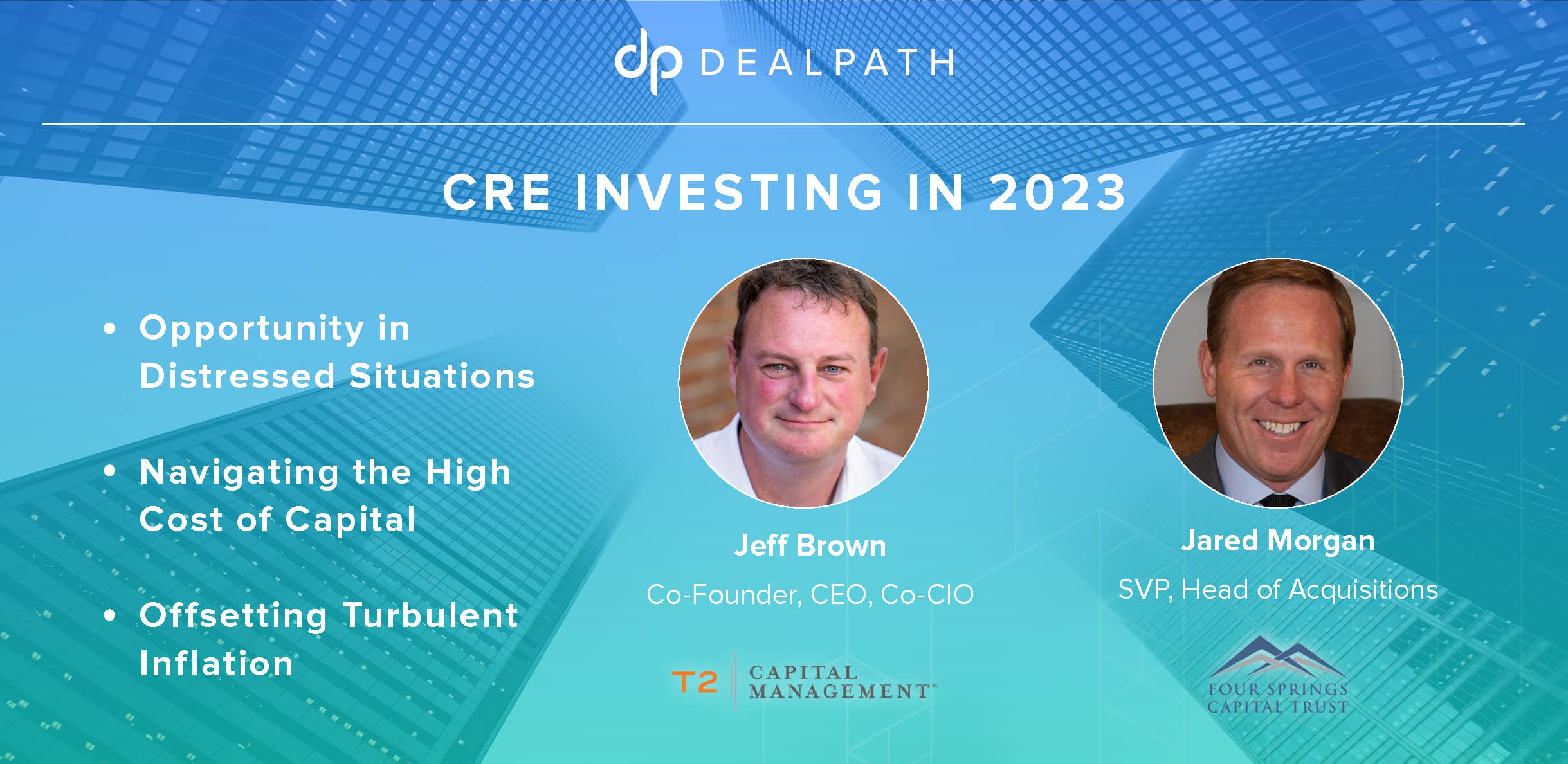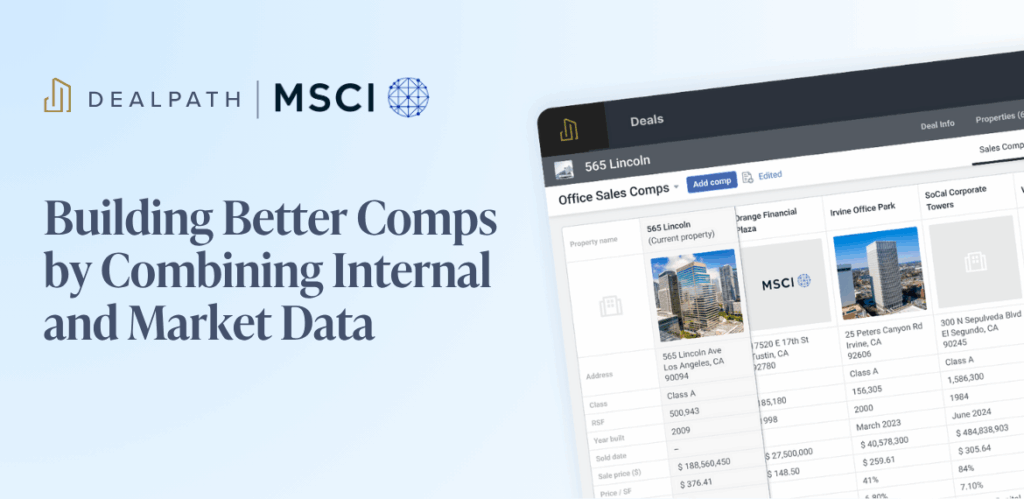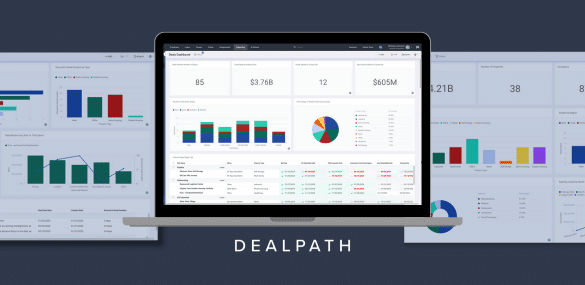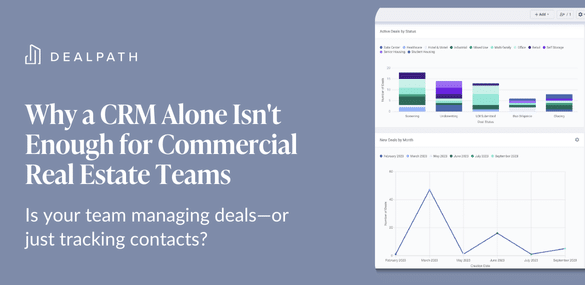It’s no secret that inflation, rising interest rates, supply chain issues and global market volatility have forced institutions to reevaluate, pivot and reprioritize investment strategies. Commercial real estate retreated from record-breaking transactional volume in 2021 to the safety of tighter criteria in 2022, as recessionary signals, a 4.5% increase in interest rates and global market volatility shaped a unique 2023 outlook.
While confronted with a challenging landscape, investors have found pockets of opportunity in situations and markets that might otherwise be overlooked. According to S&P Global Market Intelligence, transactional volume in 2022 was only 16.6% lower than in 2021. One thing is clear: the most profitable opportunities will fall to institutional investors prepared to surface them.
As investors continue to navigate stormy weather conditions in 2023, Dealpath sat down with institutional real estate investment leaders to understand the evolving CRE landscape. Read on to learn how CRE leaders across debt, equity and net lease investing plan to navigate the market in 2023, including finding opportunity in distress, the rising costs of capital, and proven strategies for mitigating the bottom-line impact of a competitive market.
Taking an Aggressive Posture in a Counter-Cyclical Market
“We’ve succeeded in finding opportunities to acquire relatively stabilized properties via distressed situations, whether due to an ill-timed loan maturity, or a cash-strapped owner caught in a situation in which additional capital is necessary to right-size the capital stack. The recent market shifts have allowed us to maintain an aggressive posture and be opportunistic.”

-Jeff Brown, CEO of
T2 Capital Management
For T2 Capital Management, a fully integrated private equity real estate firm based in Wheaton, Illinois, deploying capital throughout the pandemic was difficult to rationalize given the heavily stimulated economy, precipitous drop in cap rates, and corresponding historically high real estate valuations. As interest rates aggressively increased in the latter half of 2022 and capital deployment slowed across the industry, the firm leaned into opportunistic deals.
“The competitive field in the debt origination space all but cleared, so we found opportunity where banks, insurance companies and other lenders pulled back,” said Jeff Brown, CEO of T2 Capital Management. “By the end of 2022, we deployed $225M+, the highest annual amount for our debt fund in our eight-year history.”
On the acquisitions side, T2 Capital Management is capitalizing on opportunities it has not seen in years.
“We’ve succeeded in finding opportunities to acquire relatively stabilized properties via distressed situations, whether due to an ill-timed loan maturity, or a cash-strapped owner caught in a situation in which additional capital is necessary to right-size the capital stack. The recent market shifts have allowed us to maintain an aggressive posture and be opportunistic.”
The affordable housing crisis has also driven T2 Capital Management to create a new third line of business: developing housing solutions that meet Area Median Income (AMI) threshold standards for frontline workers across the markets that need them most.
“At T2, our heart is in affordable housing. We see this as an opportunity with incredible potential for scale. As we grow, we aspire to become a top 50 landlord across key housing markets to provide these much-needed solutions for the ‘missing middle.’”
Monitoring the Costs of Debt & Equity Capital for 2023 in this Turbulent Environment
“We expect to see more distressed sellers coming to market given the fluctuations in asset values and heightened cost of refinancing. This will drive transactional activity and present buyers with more opportunities to deploy dry powder, albeit at a lower velocity than in late 2021 and early 2022.”

-Jared Morgan, Head of Acquisitions
Four Springs Capital Trust
As a triple net lease investor that understands market conditions and diligently screens tenant credit prior to securing stable, long-term leases, Four Springs Capital Trust has not seen any material impact on the underlying tenants within its portfolio. The primary impact of today’s economic environment in the net lease space has been an increase in the cost of capital.
“As a general rule, we aim to invest in properties with leases that include CPI-based or annual rent bumps,” said Jared Morgan, Head of Acquisitions at Four Springs Capital Trust. “We are focused on securing long-term durable cash flow and annual rent increases that help offset turbulent inflationary periods like we are in today.”
While high borrowing costs on both the debt and equity side have driven a significant slowdown in transactional activity, Morgan said that an overall adjustment in pricing and pressure from near term expiring debt will create new opportunities.
“Deal pricing is the predominant variable between this year’s slowdown and the high transactional volume of 2021 and early 2022. The overnight rise in the cost of debt and equity created the slowdown in transaction volume for the second half of 2022. The stress in our market has been on the cost of capital for investors. The business fundamentals behind our tenants, which varies from international credits to regional operators, has remained stable and healthy.”
“I believe the market is rapidly adjusting to today’s financial environment through efficient deal pricing. The stress in our space will be the result of CMBS and other debt vehicles maturing near term and capital taking advantage of the adjustment in market valuations of the underlying assets. We expect to see more distressed sellers coming to market given the fluctuations in asset values and heightened cost of refinancing. This will drive transactional activity and present buyers with more opportunities to deploy dry powder, albeit at a lower velocity than in late 2021 and early 2022.”
Why It’s Time for Deal Management
While it’s unclear how the market will respond to ongoing volatility and when investors can expect interest rates to become affordable, institutions that are poised to capitalize on emerging opportunities will win.
Download the white paper to learn why T2 Capital Management, Four Springs Capital Trust and seven of the top ten institutional investors have adopted Dealpath as their deal management platform of choice for systematizing data-driven investment decisions.



